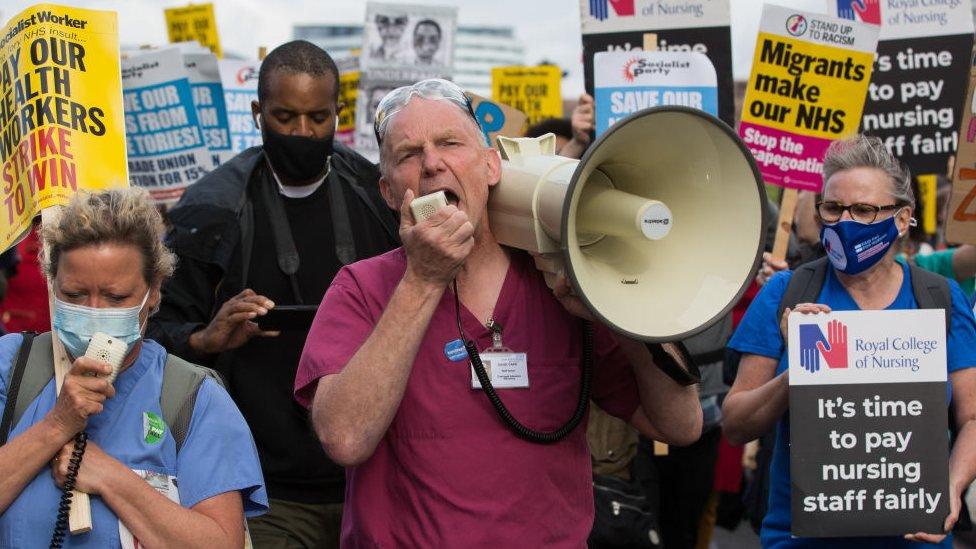Why the government line on strikes is hardening
- Published

Nurses are due to strike in December
The breadth and scale of strikes in the coming weeks present the government with huge political problems as health workers, transport staff and Border Force staff are among the thousands of workers planning walkouts.
The government has been ramping up preparations to mitigate the impact of strikes - as it becomes increasingly likely they will happen.
But the line has hardened that more money is not available.
There is a fear in parts of Whitehall that if the pay demands of one sector are accepted, everyone else will want the same.
That may sound reasonable to some, but ministers believe is it unaffordable and could lead to an inflationary spiral.
So what do they do?
Well, part of the battle is for hearts and minds.
When it comes to transport strikes by the RMT union, the government strategy appears to be to hope that the public turns against them.
Cabinet ministers believe that may have started to happen in response to recently-announced strikes over Christmas.
That does not settle the argument, but some in government believes it weakens the hand of the unions.
One-off payments
It is not guaranteed to work - the RMT are keen to sell their message to the public too.


And it becomes a lot harder when it comes to NHS staff, who helped get the country through the darkest days of the coronavirus pandemic.
Ministers are not going to budge on pay demands they regard as too high - but there is an acknowledgement in government that the public have a lot more sympathy for nurses and ambulance staff struggling with the cost of living.
Some MPs want ministers to make one-off payments to help with current pressures.
Watch: RMT chief Mick Lynch says union forced into Christmas strike action
What is noticeable is how the government's rhetoric on strikes - and possibly its response, too - has hardened in a short space of time.
On Tuesday. Downing Street said that while they kept matters under review, there were no plans to extend embryonic legislation on minimum service levels on strike days beyond the transport sector.
Twenty four hours on - and after action by ambulance crews was announced - No 10 has confirmed that minimum service levels will be imposed in other parts of the public sector.
They are yet to specify exactly where. They promise - or threaten - details "shortly".
'Get tough'
Policy options are apparently being worked on within the Cabinet Office under Chancellor of the Duchy of Lancaster Oliver Dowden.
And No 10 would not even rule out - at this stage - a ban on strike action amongst those emergency workers who currently allowed to take industrial action, such as ambulance crews.
Sources acknowledge that no new measures would be in place to mitigate the effects of the pre-Christmas strikes.
No timescale is being given but signalling a willingness to "get tough" may mollify angry Conservative backbenchers and usually supportive newspapers, while also drawing a dividing line with Labour, which will oppose new trade union laws and repeal many existing ones.
But perhaps sensing at least a diminution of public support for industrial action as the scale of strikes increases, a strategy of sorts appears to be emerging.
This can be summed up as not budging on inflation-proof pay increases; threatening tougher laws if the expected strike action goes ahead; actual legislation to curb a similar scale of strikes in future and contingency plans to deal with the current action.
The PCS union says the government is training army personnel to stand in for striking border force staff and while there has been no formal request from the health department for military support in the ambulance dispute, informal discussions have already been held.